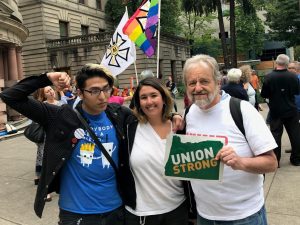Huge congratulations rightly go out to the members of the Burgerville Workers’ Union for winning NLRB elections at two Burgerville locations, and in the process, becoming part of the first union in history to be certified as an official collective bargaining representative in a fast food establishment.

But those of us who cheer these workers on must understand. We may only be at the very first step of a long struggle to win a union to stand behind these brave, determined workers. To be real, and to be worth the sacrifice, the newly minted union must negotiate a contract with Burgerville that actually increases workers’ security and makes material improvements to their working conditions.
As the initial rounds of bargaining open, the company has come to the table with representations of its good faith, even having taken to the media to present Burgerville as respectful of workers’ rights and eager to become a pioneer in the industry in working productively with the union. If the company is sincere, negotiating a contract should be quick and relatively painless.
But so far, nothing substantive has been agreed, and, at the same time, key activists have been fired on pretextual charges by the company, which refuses to discuss their reinstatement. One wonders.
If you assume that Burgerville is just as opposed to sharing control of its workplaces as it has been up to now, we still could have a huge fight ahead. Workers at about half a dozen of the 42 Burgerville stores have publicly come out in support of the union, and so far have won NLRB elections at only two. The contract would only cover workers at the two NLRB-certified locations. If a beneficial contract is quickly negotiated, this would encourage workers in other stores to join the campaign. To avoid this, Burgerville could slow walk the contract negotiations and continue pressuring the workers who led this historic drive in an effort to convince workers in unorganized stores—and even in the organized shops—that there is no future with the union, and no benefit from paying union dues. We are hopeful that the company will continue having real discussion about the union’s demands for fairer scheduling, better wages, and a safer, more respectful work environment. But if Burgerville management is blowing smoke about wanting to respect workers’ choice to organize, it may dig in against allowing any good to come from recognition of the union.
If that happens, what’s to be done? In the long run, the NLRA must be amended to require arbitration of first contracts. Under such a system, after a reasonable period of bargaining to reach a mutual agreement, both sides would offer their last and best offer of contract terms, and an arbitrator would choose one or the other offer, which would be recognized as the initial contract. Since both sides will want their terms to be chosen, each has incentive to offer the most reasonable acceptable terms. At a minimum, the workers would win a first contract.
Of course, we can’t expect any such change soon. But when Democrats again win control of the federal government, this, and other, labor law reforms must have a very high priority. It is not acceptable that labor law reform be put off, once again, until a “later” that never comes.
In the meantime, the workers have to stay strong, and stay together, girding for what could be a long struggle. The community must rise to support this historic effort. Even after the election victories, the boycott of Burgerville called by the union remains in effect. We can help by honoring the boycott. A rite of spring in my family, and one of my own favorite indulgences, has long been celebrating the arrival of fresh Oregon berries by enjoying a Burgerville strawberry shortcake. Won’t be doing that this spring. I hope you won’t either.
And as workers reach out for help, the community must respond with enthusiasm and vigor.
